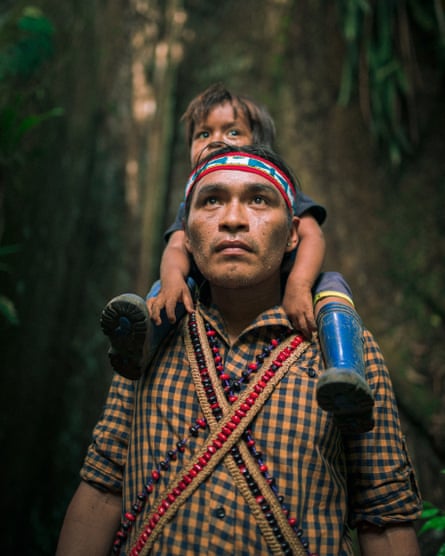Climate change and multinational corporations have long posed a threat to the people of the Amazon rainforest. Now, however, the region’s indigenous tribes face an even more immediate danger: coronavirus.
Despite living deep in the heartland of Ecuadorian rainforest, the indigenous Achuar tribal people have fallen victim to the pandemic. Over the last several weeks, Covid-19 has struck at the heart of the Achuar community in Ecuador, which is made up of 13,000 people living in 88 groups over 800,000 hectares (3,000 sq miles) along the Pastaza River basin. A further 15,000 Achuar are based in neighbouring Peru.
Eight Achuar people in Ecuador have died so far, including a four-month-old baby, and around 90% of the country’s Achuars are thought to have been infected to date.
Ecuador has been a hotspot of the virus in Latin America, with more than 110,000 cases reported and almost 6,500 deaths registered.
The Achuar people might have hoped to remain untouched, but that hope expired about three months ago, according to Tiyua Uyunkar, the president of the Achuar Nation. The initial outbreak started in communities “close to the road”, said Uyunkar, who has himself been ill and whose mother is now very unwell.
“The first road contact with Achuar territory is very close to Puyo city,” explained Uyunkar, who lays the blame on illegal logging companies. It was their workers, he said, who first brought Covid-19 to this insular tribal nation. “The loggers were travelling, going in and out from the city and returning to the community.”
Indigenous populations like the Achuar are extremely vulnerable to disease due to their geographical isolation, as well as inequality, exclusion and discrimination in access to public services.
Their location means they face serious challenges when it comes to diagnosis and treatment, while quarantine restrictions have led to shortages of food and basic supplies.
Receiving little support from the government, the Achuar are struggling to find sufficient tests, medication and personal protective equipment to combat the outbreak. They are now appealing to the international community for much-needed aid, medical supplies, training and transport. “We are doing what we can do because this virus is terrible for the indigenous people,” said Uyunkar.
As in many indigenous tribes, life in the Achuar communities revolves around elders who are revered and responsible for passing down their traditions. “We want to protect the lives of our elders because they are very important. If they die, our culture and language and history will die too,” said Uyunkar.
Official identification documents did not exist for the Achuar until the 1960s, which means most of the elders do not know their age. However, Uyunkar estimates that some are in their mid-nineties.
Skilled hunters and fishermen, the Achuar consider themselves the forest’s greatest advocates. “We are the protectors of the rainforest. If the indigenous people disappear with this virus, the rainforest will be in danger and disappear too,” Uyunkar said.
“If the guardians disappear, timber and oil companies will think the Amazon is free. That’s a very very sad part of this virus, but of course we are going to fight. I can’t say we will win, but we will do our best to confront this virus.”

Despite having extremely limited access to technology, the tribal leadership have posted a video appeal on YouTube for everything from medicine and medical training to transportation and signal amplifiers for phones, internet and radio.
Close family quarters and a communal way of life mean the illness spreads quickly, according to Uyunkar, who is 28 and has two wives and eight children. He said: “Each community is made up of 25 to 40 families and they live together.”
Under the guidance of local shamans, families wake up before dawn each day and gather to drink a stimulating guayusa tea to induce vomiting, which they believe has a purifying effect.
“The Achuar are very friendly, peaceful people and we share our drinks and our food with our families and friends, which is why it’s spreading very fast in our communities,” Uyunkar said.
Airstrips have been closed to limit the spread of the virus, while Uyunkar is working alongside teams of volunteers to educate and train his people. “Each community is given medicine and also their elders will help train the young people to make the Achuar medicine with medicinal plants,” he said.
“The rainforest is our home and the home of our god. It is our pharmacy, it is our territory, it is our market. We have many many special plants in the rainforest and we will use them to help fight this virus.
“As president I will work all the time to find help to protect our old people because they are in a very dangerous position.”
To donate, please visit http://ikiamfoundation.org
